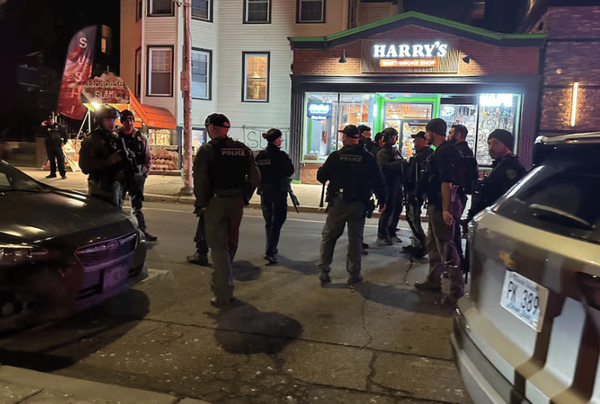
What a mad old horrible time to be a Jew. Part of me feels my whole life as a liberal Jew in Britain has been leading here, to this sharp and ragged point, where families are cracking apart and fears are being mongered.
Even by writing this, I know I will draw criticism and abuse from both fellow Jews and the people who hate them, a fact that is undoubtedly leading to uncomfortable silences from many other people like me, dealing with a grey complexity of feeling that is tricky to articulate, even inside our own heads. We were brought up on a story of Jews fleeing persecution to return to a sacred homeland, a story that rarely acknowledged the Palestinians already living there, but one that was central to British Jewish identity, and one that many of us have spent our adulthoods painfully unpicking. Unpicking at a time when antisemitism is rising, which is terrifying, and when that rise is being weaponised, which is horrifying. People like me who find themselves wading daily through weeds, trying to find a home.
In Paris two weeks ago, thousands marched to show their rejection of antisemitism – since the Hamas attacks on 7 October and Israel’s subsequent bombardment of the Gaza Strip, the number of antisemitic acts recorded in France, as in Britain, have increased dramatically – there the figures are already triple those recorded across the whole of 2022. But among those marching against antisemitism were far right leader Marine Le Pen and National Rally president Jordan Bardella. This is the party whose founder once called the Holocaust a “detail of history”; these people despise Jews, but it seems they hate Muslims even more. In the UK, the founder of the English Defence League, Stephen Lennon (better known as Tommy Robinson), is doing the same, inviting his far right followers to join him on a march against antisemitism in London. It’s chilling, but it’s smart. Not just the cynical and strategic cannibalisation of a peaceful protest by people who routinely sport swastikas, which is smart in that uniquely painful kick you in the throat kind of way – he’s working to legitimise hate by hitching himself to a mainstream movement (we’re seeing a similar scramble for legitimacy by Nigel Farage, currently celeb-washing his reputation in the jungles of ITV). Not just that. It’s also a smart way of sowing yet more division within Jewish families across Britain, some of whom will inevitably drift guilelessly towards him, “He can’t be all bad”, towards racism, away from solidarity and peace, thereby weakening communities, amplifying fears and making all our lives 50 years worse.
But divisiveness is all I see right now – society is like a broken mirror. Reality is distorting under the weight of fragmenting identities. It’s this sort of thing that makes me feel unsafe – it’s larger than antisemitism, it’s people turning inwards, twisting and splitting the world to orchestrate and exploit its impact. When 250 graffitied Stars of David appeared around Paris at the end of October, some investigators presumed it to be an antisemitic campaign, while others thought it was pro-Israel. But now, having questioned two Moldovan nationals, French intelligence services think the graffiti is a piece of Russian dezinformatsiya, intended solely to sow division and anxiety. People will see in the graffiti what they’ve been primed to see, and bad actors, like Tommy Robinson, will dance merrily through the space between.
The march he’s supporting is organised by the Campaign Against Antisemitism. I am against antisemitism. While I don’t walk through London in fear, as many claim Jewish people routinely do, I am aware of it and like all Jews always have been, and I resent the way it must be built into Jewish culture, like the safe room at my nephew’s Jewish nursery in London. So I clicked through to the campaign’s website. My people, I thought, then stopped.
The organisers of this campaign, it turns out, have a very different idea of what antisemitism is from my own. On the recent pro-Palestine protest, in which many thousands of people marched peacefully for a ceasefire, these campaigners concentrate now on the few in the crowd who held antisemitic placards. And, “Even the marchers who did not engage in this conduct still knowingly and readily marched alongside those who did,” they write. “They are just as complicit.” Jews like me, who are opposed to Israel’s policy and who condemn its war on Gaza, are complicit in antisemitism, they say, and therefore are unwelcome on the march. A march which aims to make Jews feel safe and heard and seen. Well, some Jews.
It is boggling to me. I can see why the far right want to exploit our anxieties in order to split alliances and gain power, but it is maddening to see minority groups do it from the inside, too – maddening to see the impulse, when in fear, to build barriers, seek difference, reject nuance and push each other away. When I read articles about how Jews in Britain are feeling today, I read a lot about that fear, the panic about walking through cities, the fear of other people, but I’m hearing less about the churning disquiet inside our bodies or the alarm and dread at murders committed in our name. Or the sudden rootlessness that comes from being told we’re not the right type of Jew. Or the noisy struggles inside our communities and families, where the impact of violence happening 3,000 miles away will leave lasting scars.
Email Eva at e.wiseman@observer.co.uk or follow her on Twitter @EvaWiseman







